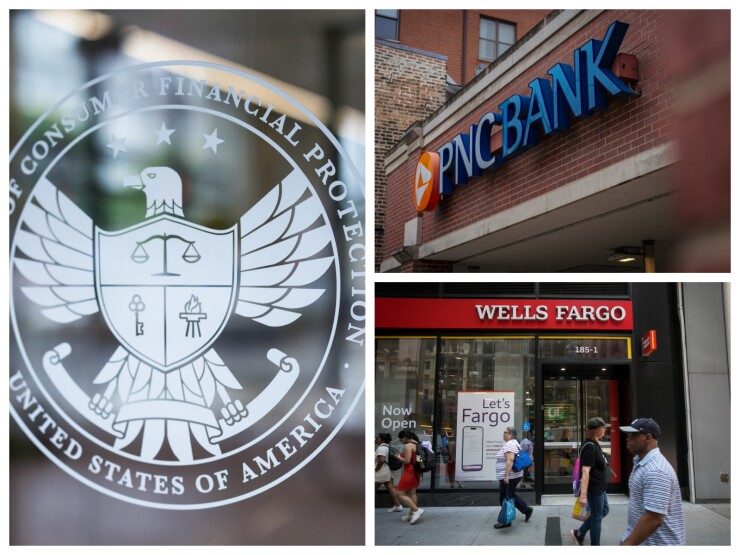
PNC Bank has quietly slashed its credit card late fees to $8, and
Industry groups are continuing to battle the CFPB in court over its proposal to cut late fees, arguing $8 is not a large enough penalty to deter tardy payments. Most credit card companies haven't budged from about $32 for the first violation and $41 for subsequent ones.
But the moves by PNC and
Other companies aren't budging but are taking other steps to prepare for lower late-fee restrictions.
Synchrony Financial, for example, has
The industry is still holding out hope that the late fee rule will get "knocked out" in court and the CFPB will come up with a "more reasonable number," said Crystal Kaldjob, a partner at the law firm Morrison Foerster. But card issuers are also increasingly grappling with the demise of substantial late fee revenue.
"There's probably a resignation that we won't go back to business as usual," Kaldjob said.
Still, the majority of card issuers have not reduced the charges since six trade groups
CFPB Director Rohit Chopra has said the drop in late fees would eliminate
"Credit card companies will still be able to penalize customers, and they will be able to charge a fee exceeding $8 if they can show that it's reasonable," Chopra said.
Industry executives have long argued that $8 is too small a penalty to prevent some customers from paying late. They also contend that their current late fee procedures are well disclosed and follow CFPB-imposed requirements.
PNC's move to slash its late fees to $8 across the board will not have a massive financial impact on the super-regional bank, whose footprint in the credit card market is smaller than that of megabanks.
The company did not respond to requests for comment on why it cut its late fees to the CFPB's desired level.
Bill Demchak, the CEO of PNC Financial Services Group, was asked about credit card late fees at a Brookings Institution conference in March. He said that the Biden administration labels legitimate charges as junk fees, and described that practice as "wrong."
Demchak hasn't been shy about criticizing industry fees in the past. Just after the 2020 elections, Demchak
Banks have a right to charge fees as long as they're fair and disclosed adequately, Demchak said in March.
"We shouldn't charge a fee because you didn't understand it," Demchak said. "To me, that's a gotcha fee. … I think that's very different [from] charging legitimate fees for legitimate service. And I think one of the issues that is playing out, at least in this administration, is an attack on any fees in banking, which ultimately leads, in my view, to bad outcomes."
The
The rewards structure for the no-late-fee card is generous — it offers 4% cash back on gym memberships, sporting events, public transportation and other purchases — in contrast with
The industry's litigation against the CFPB has taken many turns, with the U.S. Court of Appeals for the 5th Circuit recently
Last week, the CFPB filed its
Ed Groshans, a senior policy and research analyst at Compass Point Research & Trading, said he expects the court's stay will remain in place regardless of whether the case is eventually reviewed by a district court in Texas or in Washington, D.C.
"The industry seems to have a very valid argument that they will likely win on the merits, and the stay should remain in effect," Groshans said. "Our assessment is based on the statutory requirements to determine late fees, the data used by the CFPB to set the $8 late fee, and arbitrary card issuer cutoff promulgated only in the final rule."
The cutoff that Groshans referenced means that the rule would only
The fact that card issuers would potentially lose $10 billion a year in revenue is another factor that could tilt the appeals court in favor of the industry's claims, Groshans said.
The 5th Circuit, which
The legal back-and-forth has led to an unusual level of "fascination" among credit card companies over court mechanics, said Kaldjob, the Morrison Foerster lawyer.
Reducing late fees is part of a wide-ranging effort by the Biden administration to crack down on unfair or hidden fees. The lowered late fees are a victory for the Biden administration, which has made the new late fee restrictions a centerpiece of its fight against "junk fees" that's been ramping up during this election year.
Amid the legal jousting, banks that issue cards on behalf of retailers are actively negotiating changes for such store-branded cards. Both parties are thinking through different scenarios, whether the late fee is $8 or somewhere north of that, Kaldjob said.
Kaldjob, who helps negotiate contracts for both banks and merchants, said that rather than writing different scenarios into contracts, both sides are being "transparent" about the rule's potential impacts. That includes the possibility of needing to cut off some customers with lower credit scores who otherwise would have qualified for cards.
Synchrony, whose business revolves around those partnerships, got ahead of the late fee rule months ago by negotiating with its retail partners.
The bank started rolling out changes in December, Synchrony CEO Brian Doubles said in a quarterly earnings call in April, where he said that interest rate hikes and other fees would help offset the potential revenue hit.
"Our goal from the beginning has been to protect our partners and continue to provide credit to the customers that we do today," he said. "And unfortunately, that's impossible to do without these offsets."






